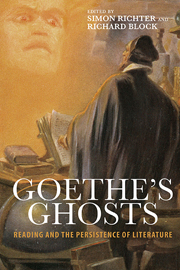Book contents
- Frontmatter
- Contents
- Introduction—Ghosts and the Machine: Reading with Jane Brown
- Part I The Ghosts of Goethe's Past
- 1 Egologies: Goethe, Entoptics, and the Instruments of Writing Life
- 2 Goethe's Haunted Architectural Idea
- 3 “Über allen Gipfeln”: The Poem as Hieroglyph
- 4 Goethe's Hauskapelle and Sacred Choral Music
- 5 From Haunting Visions to Revealing (Self-)Reflections: The Goethean Hero between Subject and Object
- Part II The Ghost That Keeps on Giving
- Part III Spirited Encounters
- Bibliography of Jane K. Brown's Publications
- Notes on the Contributors
- Index
3 - “Über allen Gipfeln”: The Poem as Hieroglyph
from Part I - The Ghosts of Goethe's Past
Published online by Cambridge University Press: 05 March 2014
- Frontmatter
- Contents
- Introduction—Ghosts and the Machine: Reading with Jane Brown
- Part I The Ghosts of Goethe's Past
- 1 Egologies: Goethe, Entoptics, and the Instruments of Writing Life
- 2 Goethe's Haunted Architectural Idea
- 3 “Über allen Gipfeln”: The Poem as Hieroglyph
- 4 Goethe's Hauskapelle and Sacred Choral Music
- 5 From Haunting Visions to Revealing (Self-)Reflections: The Goethean Hero between Subject and Object
- Part II The Ghost That Keeps on Giving
- Part III Spirited Encounters
- Bibliography of Jane K. Brown's Publications
- Notes on the Contributors
- Index
Summary
Über allen Gipfeln
Ist Ruh,
In allen Wipfeln
Spürest du
Kaum einen Hauch;
Die Vögelein schweigen im Walde.
Warte nur, balde
Ruhest du auch.
(WA 1:98)[Over all peaks
Is quiet,
In all treetops
You detect
Hardly a breath;
The little birds are silent in the woods.
Just wait, soon
You too will rest.]
The Problems
Commentators have been practically unanimous about the general atmosphere of Goethe's little poem “Über allen Gipfeln.” Release of tension, imminent repose, harmony, and so on, make up the general view. My own sense of the poem—at least of its final version, as it appeared in print from 1815 on—is different. I find in it mainly nothing but dissonances, incongruities, and contradictions. And in the end, I think, the recognition of these qualities produces a distinctly better overall reading of the text than most others.
1. The first jarring element is the title: “Ein gleiches” (Of the same sort). Ordinarily we do not expect a poem's title to present interpretive difficulties—or if it does, then only after we have worked our way through the poem itself, as in the case of “Ganymed.” But the title “Ein gleiches”—with lower-case “g,” hence requiring to be completed by an understood noun—compels us to look elsewhere to discover what it refers to. For most commentators, “look elsewhere” means simply “look elsewhere on the same page”—in either the 1815 edition or the “Ausgabe letzter Hand”—where we find above our poem the poem “Wandrers Nachtlied” (Wanderer's night-song).
- Type
- Chapter
- Information
- Goethe's GhostsReading and the Persistence of Literature, pp. 56 - 76Publisher: Boydell & BrewerPrint publication year: 2013



